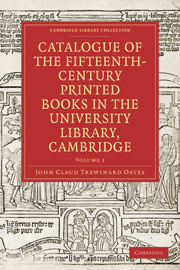A BRIEF HISTORY OF THE COLLECTION
Published online by Cambridge University Press: 10 January 2011
Summary
Mirum enim in modum hominum studia et liberalitates accenduntur, cum et prodesse sentiunt ea quae conferunt, et grata sui memoria a posteritate conservari. Cum incuria rursus et ingrata beneficiorum oblivio, eorum qui alioquin valde ad benefaciendum propensi sunt, animos avertat, studiaque extinguat.
John Caius, Historiae Cantebrigiensis Academiae liber primus (1574), p. 84.Of the many benefactors to whom the Cambridge University Library owes its collection of early printed books, the first in time is Thomas Rotherham, Archbishop of York, Chancellor of England, and (what is here of greater importance) several times Chancellor of our University, whose name was entered on the roll of its principal benefactors on 13 May 1475, in that in honorem Dei, incrementum studii, et universitatis nostrae profectum, scholas novamque superius librariam polito lapide, sumptuosa pompa, ac dignis aedificiis perfecerit, eamque, omnibus ut decuit rebus exornatam, non paucis vel vilibus libris opulentam reddidit.
Rotherham's books have outlived his building, for ‘Rotherham's Front’—the eastern range of the Old Schools quadrangle—was pulled down in 1754. Its appearance has fortunately been preserved by Matthew Parker and by Loggan. On the ground floor on either side of the entrance it contained rooms designated by Loggan Consistorium and Curia procuratorum et taxatorum, though Parker calls them simply Scholae parvae Achademiae. On the floor above, running the whole length of the building, was the Bibliotheca minor or Libraria domini cancellarii, by which name it was distinguished from the Libraria magna or Libraria communis, which occupied the first floor of the south range.
- Type
- Chapter
- Information
- Publisher: Cambridge University PressPrint publication year: 2010First published in: 1954



